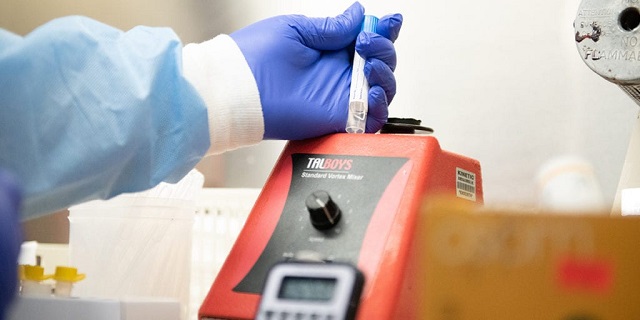No Signs COVID-19 Vaccine Causes Infertility

December 23, 2020
Even before the Food and Drug Administration (FDA) granted emergency use authorization in early December for the first vaccine designed to fight COVID-19, rumors were circulating online that such a vaccine could cause infertility. The buzzy idea may have made the rounds on social media, but there was no evidence backing up the claims. The rumor is simply unfounded, according to health experts worldwide.
“These new COVID-19 vaccines are an important step toward a return to normalcy within our society, and baseless claims about possible links to infertility shouldn’t stop people from getting inoculated,” says Thomas Bader, M.D., vice president of medical quality at Hackensack Meridian Health. “The FDA has determined that these new vaccines are safe and effective, based on rigorous clinical trials, and no evidence has suggested that problems with fertility is even a consideration.”
Understanding fears related to vaccines
Since the 1990s, some people who choose not to vaccinate themselves or their children – have contributed to spreading the idea that people should avoid vaccinations because they may be more harmful than helpful. But in reality, vaccines protect countless people from becoming ill. They can help prevent diseases and illnesses like polio, measles, the flu and pneumonia.
The new COVID-19 vaccines have the potential to help end the pandemic, once enough people receive their doses. People shouldn’t become “vaccine-hesitant” because of false online rumors.
Some people may be unsure about the safety of the COVID-19 vaccines because they contain a new type of technology, known as messenger RNA (mRNA). The new vaccines are the first to be released with this technology, but researchers have studied mRNA vaccines for years. This type of vaccine provides an immune response in a different way than other vaccines do, but it causes the same result, protecting you from disease. And mRNA technology does not lead to infertility.
Vaccines and fertility
Other types of vaccines also don’t impact fertility. In fact, doctors routinely recommend vaccinations to women who are trying to conceive, as well as pregnant women, because pregnant women and newborns may be more susceptible to illness.
Learn more about what pregnant and breastfeeding women should consider before getting the COVID-19 vaccine.
Some research suggests that COVID-19 itself – the virus, not the vaccine – may impact sperm quality, which could contribute to problems with infertility in some people. Vaccination against COVID-19 may help to protect male fertility, although more research is needed.
What side effects to expect from a COVID-19 vaccine
It’s normal and expected to experience side effects after getting vaccinated, but infertility isn’t something to expect. The most commonly reported side effects of COVID-19 vaccines are:
- feeling tired or fatigued
- headache
- joint and/or muscle pain
- fever and/or chills
- nausea and/or vomiting
- pain at the site of the injection
- swollen lymph nodes in the arm that received the injection
Such reactions are not unique to COVID-19 vaccines; all vaccinations may cause temporary, mildly unpleasant side effects like these. When your body reacts this way, it’s a sign that the vaccine is working.
In the end, Dr. Bader says, “Choosing to protect yourself, your loved ones and your community from this harmful virus should not have any impact on your fertility status.”
Next Steps & Resources:
- Meet our source: Thomas Bader, M.D.
- To make an appointment with a doctor near you, call 800-822-8905 or visit our website.
The material provided through HealthU is intended to be used as general information only and should not replace the advice of your physician. Always consult your physician for individual care.
Find a doctor near me
Common Myths about COVID-19 Vaccines Explained

Understand COVID-19 vaccines. Dr. Bader explains common myths. Learn the facts & make informed decisions about vaccination.
COVID-19 Vaccine: Should Pregnant or Breastfeeding Women Get It?

Following the Centers for Disease Control and Prevention (CDC) and the U.S. Food and Drug Administration (FDA), Hackensack Meridian Health has resumed administration of the one-shot J&...
Find a doctor near me

How to Prepare for Your COVID-19 Vaccine
Prepare for your COVID-19 vaccine. Learn how to schedule your appointment, what to wear, and what to bring. Get vaccinated today.

What Are COVID-19 Vaccine Side Effects, and How Long Do They Last?
Here are answers to questions that you may have about COVID-19 vaccine side effects.

What Can You Do After You’re Fully Vaccinated Against COVID?
There are advantages to getting fully vaccinated against COVID-19.

A Simple Breakdown of the Ingredients in the COVID Vaccines
If you’re among the many wondering “what’s actually in it?” and, “is it safe to receive the injection?”, read on.
